Beyond the Bluesky vs Threads Hype: Exploring New Social Media Horizons
Tired of the Bluesky vs Threads debate? This listicle provides a concise overview of seven social media platforms, including Bluesky, Threads, and alternatives like Mastodon, offering diverse solutions for connection and content distribution. This guide helps you navigate the evolving social media landscape and choose the right tools for your goals.
1. Bluesky
Bluesky presents a compelling alternative in the “Bluesky vs Threads” debate, offering a decentralized approach to social media that prioritizes user control and data ownership. Unlike traditional platforms, Bluesky is built on the AT Protocol (Authenticated Transfer Protocol), an open-source framework designed to foster interoperability and prevent vendor lock-in. It launched publicly in February 2024 after a period in beta, having originated as a project within Twitter before becoming independent.
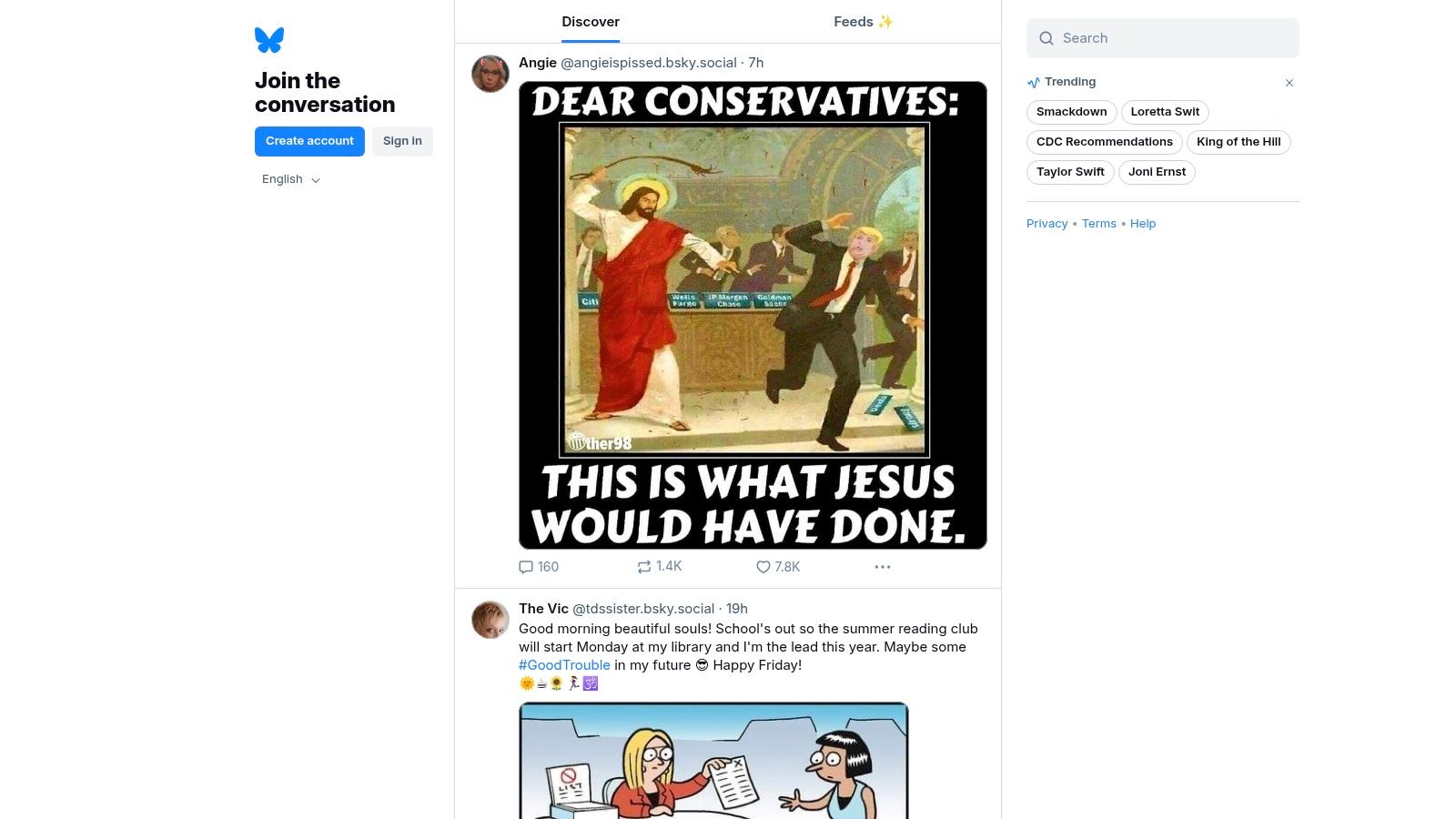
Bluesky is especially valuable for:
-
Content creators & influencers: build communities without centralized algorithm interference
-
SMBs: connect with audiences directly, without platform restrictions
-
Digital marketing agencies: experiment with decentralized content strategies
-
In-house social teams: gain more control over audience targeting and feed visibility
-
Developers & privacy-focused orgs: leverage an open protocol built for customization and innovation
To automate your publishing, try the BlueSky post scheduler to plan and schedule posts easily.
One of the most significant advantages of Bluesky is its decentralized architecture. Instead of a single, platform-controlled algorithm dictating what you see, Bluesky allows you to choose from various algorithmic feeds or even create your own.
Learn more about how to schedule posts on Bluesky to streamline your content workflow.
Bluesky also provides robust moderation tools and supports community-driven content filtering. The open-source nature of the AT Protocol encourages third-party development, fostering a rapidly growing ecosystem of apps and services.
Setting up a Bluesky account is straightforward. You’ll need an invite code initially, but once in, the process is similar to other platforms.
Limitations of Bluesky:
-
Smaller user base compared to larger platforms like Threads
-
Less mainstream content and weaker influencer ecosystem
-
Technical aspects of decentralization may overwhelm casual users
-
Still in early-stage development, with features being rolled out gradually
-
Third-party app ecosystem is growing but not yet mature
Bluesky has experienced steady growth since opening to the public, surpassing 5 million users in early 2024. Its “algorithmic choice” is a major reason developers and privacy-focused users are gravitating toward it.
2. Threads by Meta
Threads launched in July 2023 as Meta’s answer to X (formerly Twitter). It features a familiar feed-driven interface where users can share text updates, images, and videos. Its biggest strength is its integration with Instagram, allowing instant sign-up and follower syncing.
For content creators and businesses, Threads offers fast reach thanks to Instagram’s 2+ billion users. Users can cross-post content between Instagram and Threads, maximizing engagement.
Threads allows text posts up to 500 characters, supports media attachments, and includes discovery features for trending conversations. Support for ActivityPub is planned, which could eventually connect Threads to the wider fediverse.
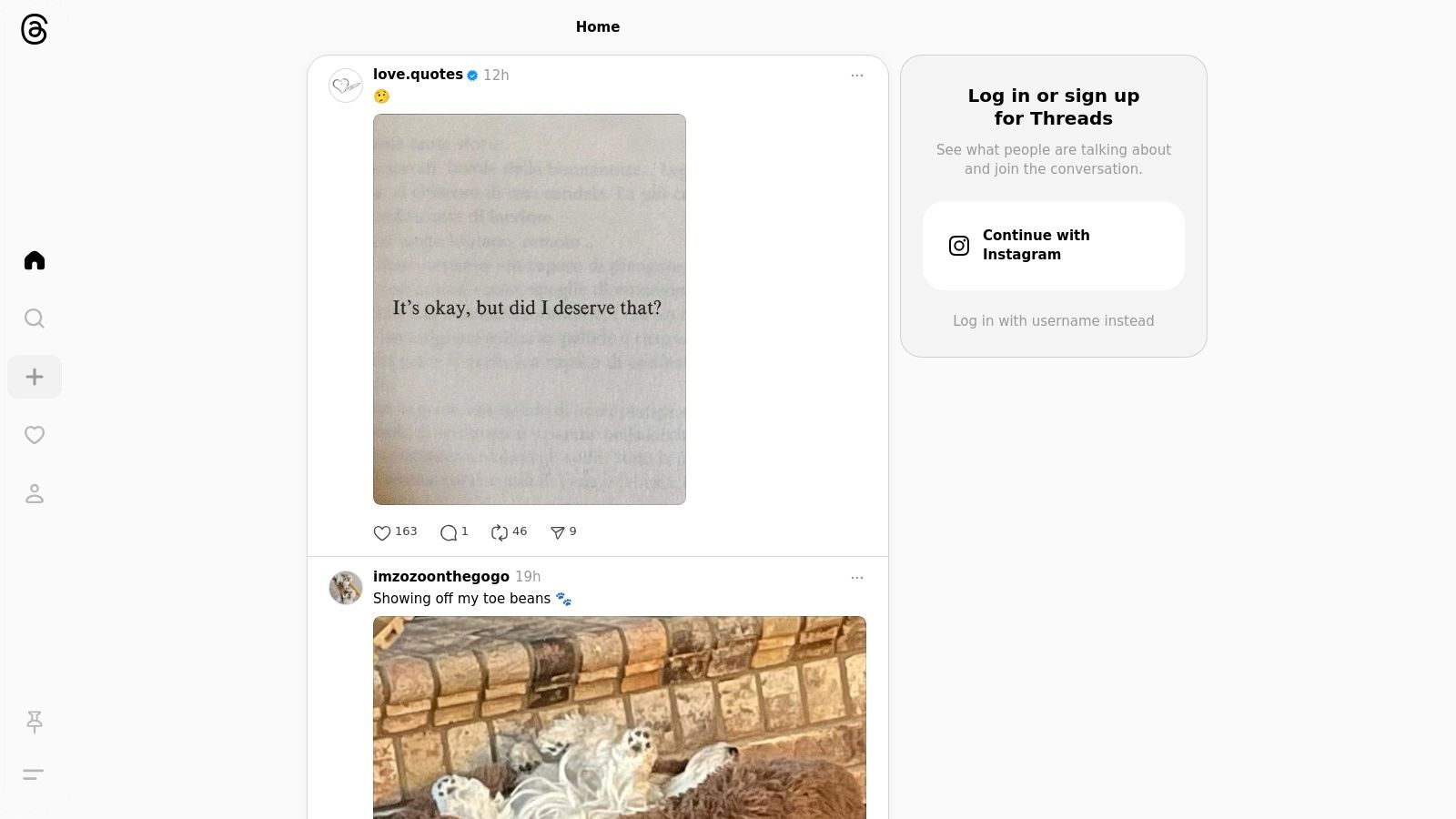
Drawbacks of Threads:
-
Requires an Instagram account to sign up
-
Limited customization options for branding
-
Meta-related privacy concerns apply here as well
-
Algorithm-driven feed limits user control
-
Centralized structure increases risk of censorship or manipulation
-
No full chronological feed or robust search features (yet)
For those considering using Threads as part of their social media strategy, some implementation tips can be beneficial. Start by optimizing your Instagram profile to ensure a smooth transition to Threads. Experiment with cross-posting content to gauge audience engagement on both platforms. Engage actively in relevant conversations to build a following and establish your presence. While Learn more about Threads by Meta might focus on scheduling for Twitter, the core principles of content planning and engagement remain relevant for Threads. Monitor the platform’s development closely, paying attention to new features and updates that could enhance your experience and reach.
Despite the potential drawbacks, Threads’ seamless Instagram integration, massive user base, and rapid feature development make it a strong contender in the ever-evolving social media landscape. For individuals and businesses already invested in the Instagram ecosystem, Threads provides a natural extension for engaging in real-time conversations and building stronger connections with their audience. As the platform matures and addresses concerns surrounding customization and data privacy, its place in the “bluesky vs threads” discussion is likely to solidify further. You can explore Threads and create an account by visiting https://threads.net.
Despite rapid adoption, Threads still lacks several features that limit its usefulness for professional communication and real-time news discovery. These include limited search functionality, the absence of a fully chronological feed, and weaker desktop support compared to established platforms. Meta’s algorithm-driven feed also means users cannot control how posts are ranked or displayed, which analysts have identified as a major barrier for power users, journalists, and brands. While its integration with Instagram remains Threads’ biggest strength, it also means the platform inherits some of Instagram’s limitations—especially around data visibility and personalization.
3. X (formerly Twitter)
The Bluesky vs Threads conversation exists largely because of the instability and policy changes happening on X. Many users frustrated by verification changes, inconsistent moderation, or algorithmic volatility have shifted attention to alternatives.
X still provides real-time microblogging, trending topic discovery, and Twitter Spaces for audio conversations. Premium tiers offer additional features like longer posts and prioritized ranking.
For content creators and businesses, X remains a powerful tool for real-time engagement and visibility. However, controversies around moderation, paid verification, and platform stability continue to push users toward alternatives.
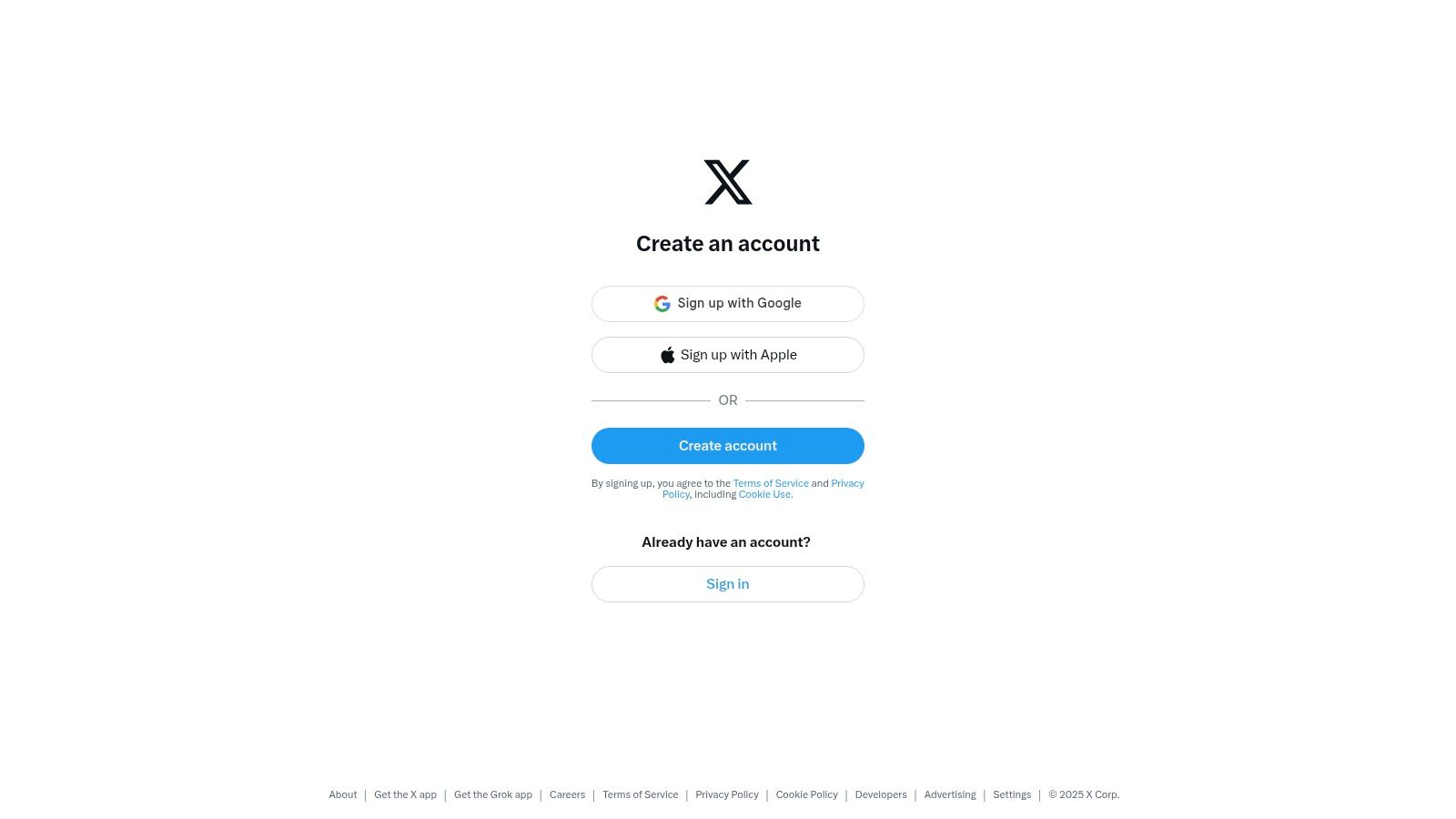
Pros of X:
- Established user base and network effects: Reach a vast audience quickly.
- Real-time news and information hub: Stay up-to-date on current events.
- Extensive third-party integrations and tools: Enhance functionality and analytics.
- Strong presence of journalists, politicians, and thought leaders: Engage with influential voices.
Cons of X:
- Inconsistent content moderation policies: Potential exposure to harmful content.
- Paid verification system concerns: Raises questions about authenticity and access.
- Platform instability and frequent policy changes: Difficulty adapting to a shifting environment.
- Rising concerns about misinformation and hate speech: Challenges for maintaining a healthy online community.
Website: https://x.com
In conclusion, X remains a powerful platform despite its controversies. However, its shortcomings have created an opening for alternatives like Bluesky and Threads. Understanding X’s strengths and weaknesses is key to understanding the competitive landscape and choosing the right platform for your needs. While X offers unparalleled reach and real-time engagement, concerns about its future direction and stability have made exploring alternative options a viable consideration for many users, including independent creators, businesses, and developers. The “Bluesky vs. Threads” debate is unfolding in the shadow of X, and the choices users make will ultimately shape the future of online social interaction.
4. Mastodon
Mastodon is a decentralized, open-source platform that prioritizes user control. It operates on the ActivityPub protocol, forming a federated network known as the “fediverse.”
When comparing Bluesky vs Threads, Mastodon stands out as the original decentralized alternative. Threads is expected to join the fediverse soon through ActivityPub.
For content creators, Mastodon allows reaching niche communities without algorithmic interference. Privacy advocates and developers appreciate its transparency and customization.
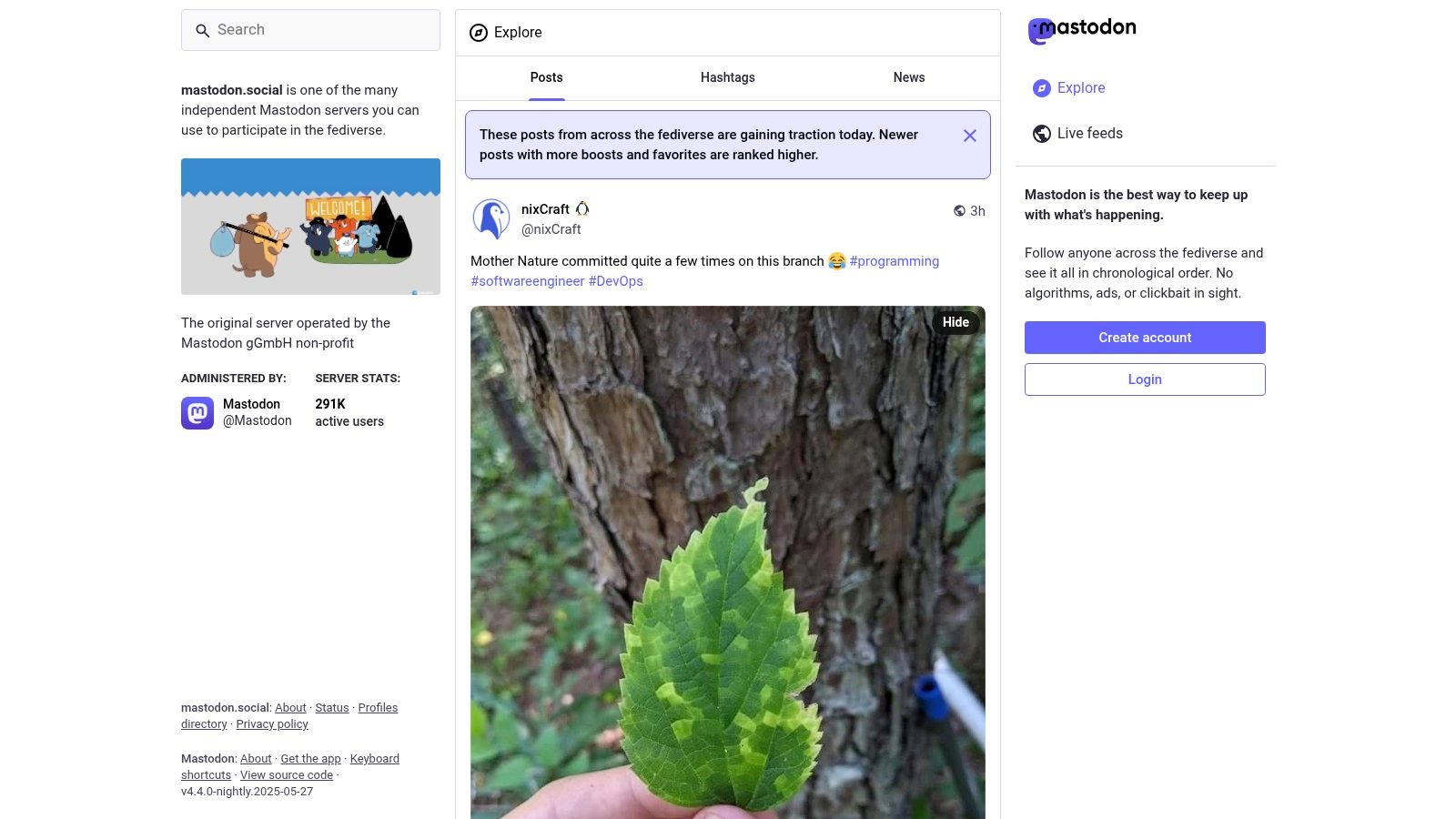
Key Features & Benefits of Mastodon:
-
Fully decentralized network with no single point of control
-
500-character posts allow richer discussions than Threads
-
Strict chronological timeline (no algorithmic manipulation)
-
Advanced content warnings for sensitive topics
-
Community-defined moderation and governance
-
No advertising or corporate influence
-
Open-source architecture enabling full customization
-
Connects with other fediverse platforms through ActivityPub
Pros and Cons:
Pros:
- Complete decentralization and no single point of control
- Strong privacy controls and community-driven moderation
- No advertising or corporate influence
- Interoperability with other fediverse platforms
Cons:
- Complex server selection process for new users
- Fragmented user base across multiple instances
- Technical barriers for mainstream adoption
- Inconsistent moderation standards across servers
Getting Started with Mastodon:
- Choose a Server: Research different instances based on their focus, community rules, and moderation policies. A good starting point is Mastodon.social, but numerous other options exist.
- Create an Account: The signup process is similar to other social media platforms.
- Explore and Connect: Find and follow users and hashtags relevant to your interests.
Pricing and Technical Requirements:
Mastodon is free to use. The technical requirements are minimal, requiring only a device with internet access and a web browser or mobile app. While individuals can host their own instances, this requires more technical expertise.
Mastodon offers a compelling alternative to Bluesky and Threads, especially for those who value decentralization, privacy, and community ownership. While navigating the fediverse may present a slight learning curve, the potential rewards in terms of control, transparency, and freedom make Mastodon a worthy contender in the evolving social media landscape. If you’re looking for a platform beyond the control of a single corporation, Mastodon deserves your consideration. Visit https://mastodon.social to learn more.
5. LinkedIn
LinkedIn remains the largest professional networking platform, offering long-form content, business networking, and industry-focused discussions.
For businesses, LinkedIn provides strong lead-generation tools, company pages, and detailed analytics. Digital marketing agencies and consultants use LinkedIn to connect with clients and share thought leadership.
While powerful, LinkedIn can feel overly corporate, and premium features can be costly.
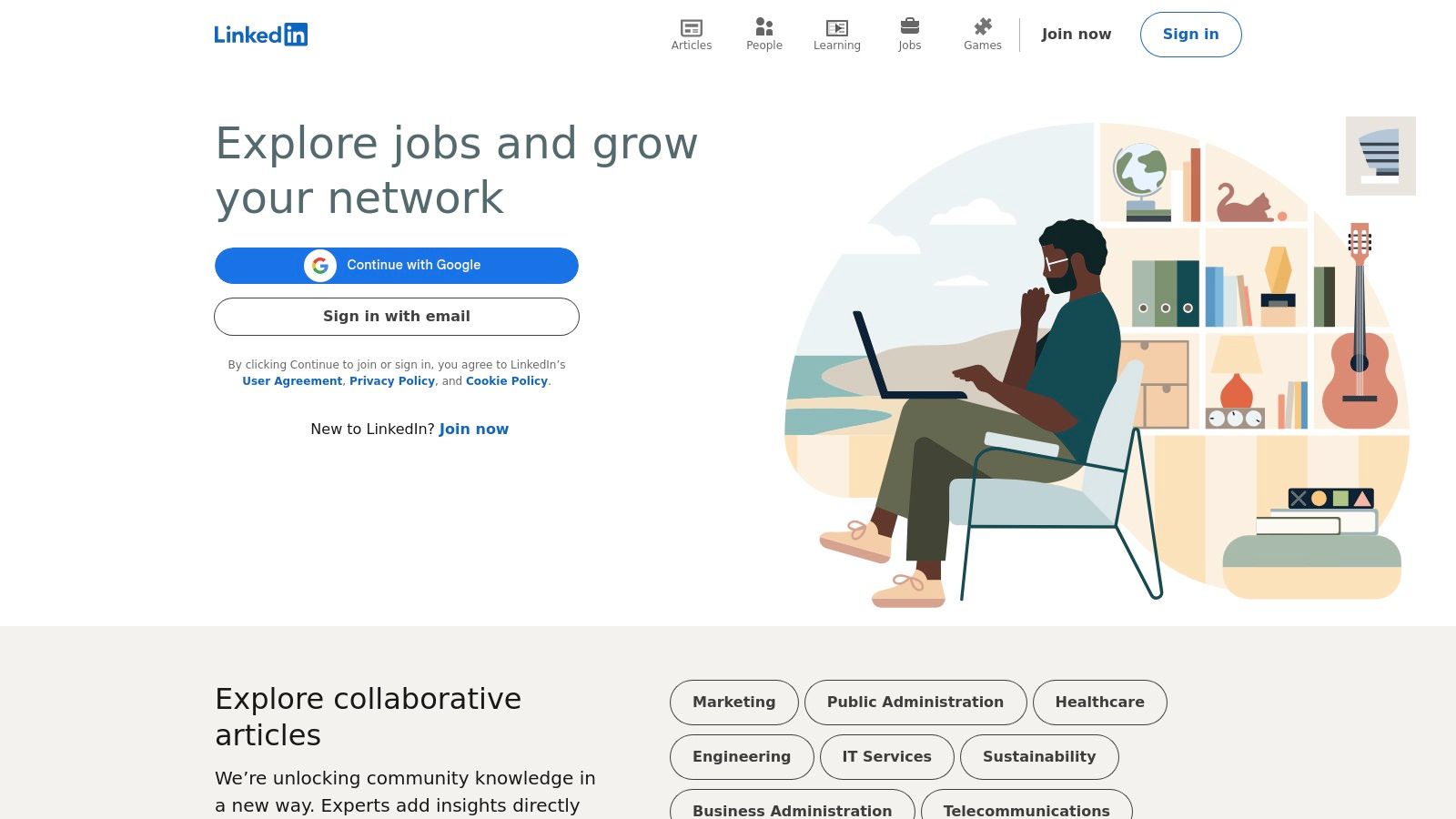
Threads offers wider immediate reach through Instagram, while Bluesky offers more control. LinkedIn instead shines for professional networking, B2B communication, and long-term brand building.
6. Discord
Discord is not a direct competitor to Bluesky or Threads, but it offers powerful community-building tools through server-based communication.
It’s ideal for creators and brands wanting deeper engagement through channels, roles, voice chats, and real-time discussions. Bots enhance moderation and automation.
Discord is free to use, with optional Nitro perks.
Its limitations include low discoverability, invitation-only access, and weaker search/archiving for long-term content.
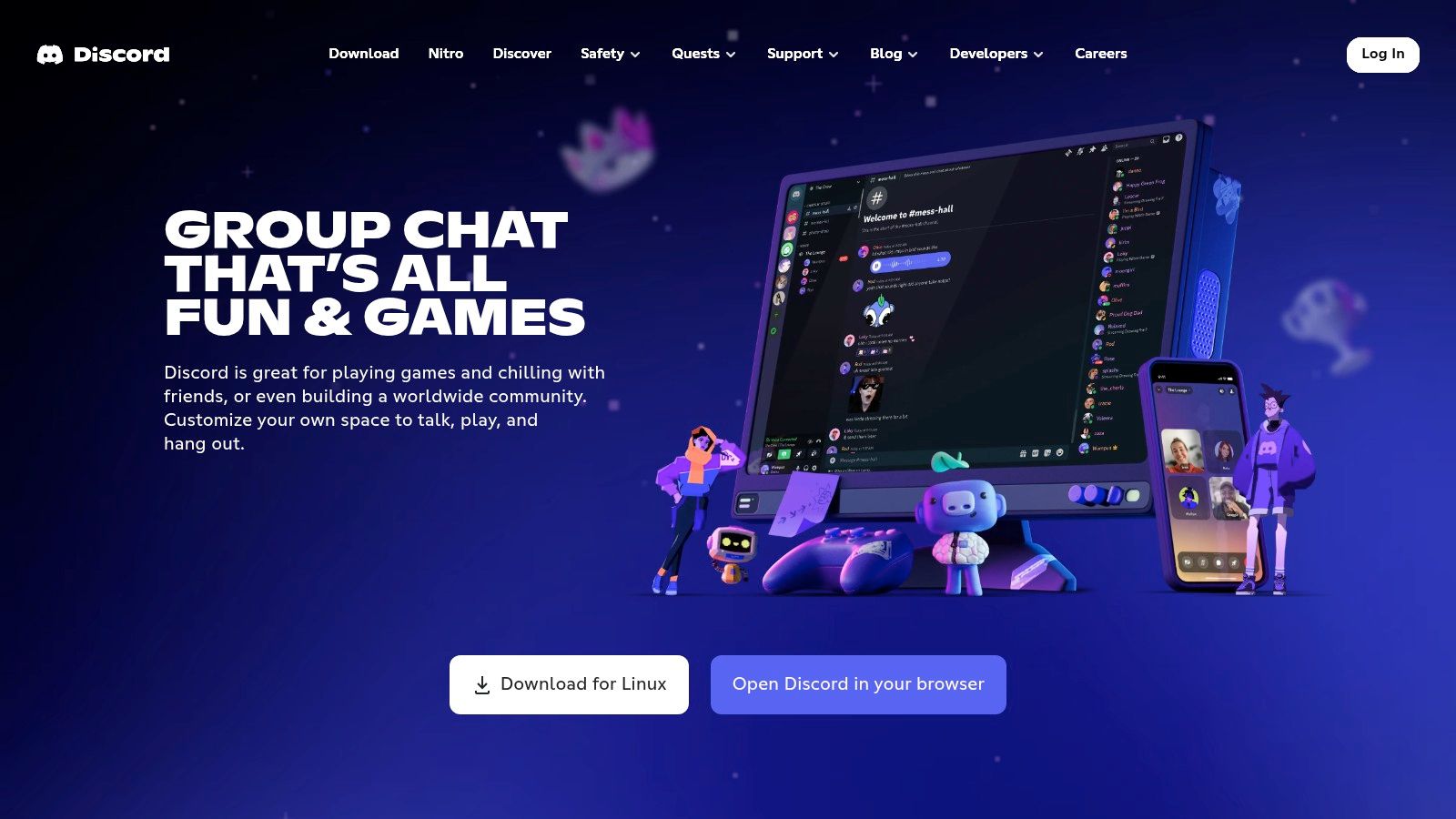
Its limitations include low discoverability, invitation-only access, and weaker search/archiving for long-term content.
7. Reddit
Reddit offers an entirely different experience based on topic-specific communities called subreddits. It supports long-form discussion, community-driven moderation, and deeper engagement.
For brands and creators, Reddit is useful for AMA sessions, audience feedback, and niche communities.
How Reddit Works (Core Features):
-
Upvote/downvote system controls content visibility
-
Threaded discussions encourage deeper, long-form conversation
-
Subreddit structure enables niche communities
-
Asynchronous communication allows high-quality responses
-
Real-time chat exists but is not the platform’s focus
Platform Features Comparison: Bluesky vs Threads & Others
| Platform | Core Features/Characteristics | User Experience / Quality ★ | Value Proposition 💰 | Target Audience 👥 | Unique Selling Points ✨ |
|---|---|---|---|---|---|
| Bluesky | Decentralized AT Protocol, custom feeds, moderation tools | ★★★★☆ Smaller user base, evolving | 💰 Free, open protocol | 👥 Privacy-focused users, developers | 🏆 True decentralization, data ownership |
| Threads by Meta | Instagram integration, 500-char posts, real-time trends | ★★★★☆ Seamless ecosystem use | 💰 Free, ad-supported | 👥 Instagram users, casual social | ✨ Cross-posting with Instagram, verified badges |
| X (formerly Twitter) | Real-time microblogging, Spaces, premium tiers | ★★★☆☆ Established but unstable | 💰 Freemium with subscription | 👥 Broad public, media, influencers | 🏆 Real-time news hub, extensive integrations |
| Mastodon | Federated network, 500-char posts, open-source, no algos | ★★★★☆ Decentralized, complex UX | 💰 Free, self-host option | 👥 Privacy advocates, niche communities | 🏆 No ads, community moderation, fediverse support |
| Professional network, job tools, articles, groups | ★★★★☆ High quality, stable | 💰 Free + premium subscriptions | 👥 Professionals, recruiters | 🏆 Largest professional network | |
| Discord | Server-based chats, voice/video, bots, real-time | ★★★★☆ Rich real-time communication | 💰 Free, Nitro subscription option | 👥 Gamers, communities, hobbyists | ✨ Highly customizable, multimedia chats |
| Topic-based subreddits, voting, threaded discussions | ★★★★☆ Deep discussions | 💰 Free, ad-supported | 👥 Broad public, niche interest groups | 🏆 Community-driven moderation, democratic ranking |
When comparing Bluesky vs Threads directly, Bluesky excels in decentralization, feed customization, and data portability, making it ideal for users who value openness and independence. Threads, on the other hand, provides a polished user interface, direct access to billions of Instagram users, and rapid adoption. Bluesky’s strength lies in user control; Threads’ strength lies in scale. Choosing between the two ultimately depends on whether you prioritize freedom or reach.
Navigating the Social Media Galaxy: Choosing the Right Platform for You
The social media landscape is constantly evolving, and the emergence of platforms like Bluesky and Threads alongside established giants like X (formerly Twitter), Mastodon, LinkedIn, Reddit, and Discord offers a diverse range of options for content creators and businesses. This article has explored the key differences between these platforms, highlighting their unique strengths and weaknesses. From Bluesky’s decentralized approach to Threads’ integration with Instagram, and considering the professional networking focus of LinkedIn versus the thriving communities on Reddit and Discord, the ideal platform for you depends on your specific goals and target audience. Choosing between Bluesky vs Threads, or any of these options, requires careful consideration of your content strategy and community engagement objectives.
Remember, it’s crucial to maintain a healthy balance between online and offline life as you explore different platforms. For more tips on managing your tech habits and prioritizing your wellbeing in the digital age, check out this helpful guide on digital wellbeing from SureSpace.
Ultimately, successful social media engagement hinges on understanding your audience and tailoring your content to resonate with them on the platforms they prefer. As you navigate this exciting digital landscape, remember to prioritize authenticity and build genuine connections.
Streamline your social media management across platforms like Bluesky and Threads with Postiz. Postiz offers powerful scheduling, cross-posting, and analytics tools to help you maximize your reach and engage effectively with your audience, no matter where they are.






